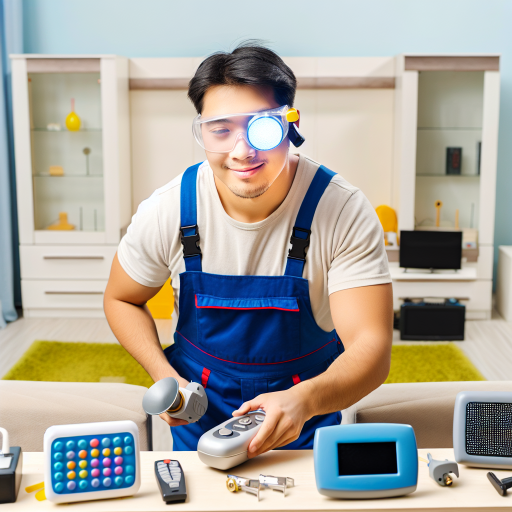Introduction to Home Automation Hubs and Their Importance to Real Estate Buyers
Home automation hubs serve as central control systems for smart devices.
They enable seamless integration of technology within a home.
Real estate buyers increasingly value convenience in their living spaces.
Home automation enhances daily living through improved efficiency.
Moreover, it provides a level of security that appeals to many homeowners.
These systems simplify tasks like lighting control and temperature regulation.
Consequently, buyers can tailor their home environment according to their preferences.
Real estate transactions increasingly highlight smart home features.
Many prospective buyers seek homes equipped with these advanced amenities.
Home automation hubs can significantly impact a property’s perceived value.
Therefore, understanding their features helps buyers make informed decisions.
In addition, such technology often leads to energy savings.
Automated systems can manage energy use more effectively.
Subsequently, this contributes to lower utility bills for homeowners.
Additionally, smart homes often include remote access capabilities.
This allows users to manage systems from anywhere via mobile devices.
As interest in smart living grows, home automation becomes a priority.
Ultimately, investing in properties with advanced automation hubs is prudent.
In summary, home automation is a key factor for today’s real estate buyers.
Key Features to Look for in Home Automation Hubs
Compatibility with Smart Devices
Your home automation hub should support a wide range of devices.
This includes lights, locks, cameras, and thermostats.
Check compatibility with protocols like Zigbee and Z-Wave.
Using a hub compatible with multiple brands increases versatility.
User-Friendly Interface
Look for a hub with an intuitive and easy-to-navigate interface.
A user-friendly app enhances your experience and control.
Check for customizable dashboards and settings.
A simplified setup process can save you time and frustration.
Voice Control Integration
Voice control is a convenient feature for hands-free operation.
Ensure your hub works seamlessly with virtual assistants like Alexa or Google Assistant.
This allows for quick access to commands and automation routines.
Voice integration adds an element of modern comfort to your home.
Robust Security Features
Security should be a top priority for any home automation system.
Look for two-factor authentication and data encryption options.
Regular firmware updates help protect against vulnerabilities.
Consider hubs that offer security monitoring and alerts.
Custom Automation and Scheduling
Your hub should enable custom automation routines for efficiency.
Scheduling options ensure your devices work at optimal times.
For instance, set the lights to turn on at sunset.
Custom automations enhance your home’s functionality and convenience.
Expandable Ecosystem
Select a hub that supports future expansion of devices.
An expandable ecosystem allows you to grow your smart home over time.
Think about the potential addition of new technology or features.
An adaptable hub ensures your system remains relevant and functional.
Good Customer Support
Reliable customer support is crucial for troubleshooting issues.
Research the availability and responsiveness of support teams.
Online resources, like FAQs and forums, can also be helpful.
Good support enhances your overall experience with the hub.
Comparison of Popular Home Automation Hubs
Overview of Home Automation Hubs
Home automation hubs serve as central controllers for smart devices.
They connect various devices, allowing users to control them from a single interface.
Smart home technology enhances convenience and energy efficiency.
Google Nest Hub
The Google Nest Hub offers a user-friendly interface.
It integrates seamlessly with Google Assistant and various devices.
Additionally, it supports voice commands for hands-free operation.
However, its limitations include fewer compatible devices compared to others.
Amazon Echo Plus
The Amazon Echo Plus features built-in Zigbee hub capability.
This allows direct connection to compatible smart devices.
Moreover, it boasts impressive sound quality for music streaming.
Yet, it may lack some advanced features found in other hubs.
Apple HomePod mini
Apple HomePod mini works well with Apple devices.
It provides a robust ecosystem for users already invested in Apple products.
The device prioritizes privacy and security.
Nonetheless, it might not support as many third-party devices compared to others.
Samsung SmartThings Hub
The Samsung SmartThings Hub excels in compatibility.
It supports a wide range of devices from various manufacturers.
Customizable automation routines enhance user experience.
On the downside, setup can be complicated for new users.
Choosing the Right Hub
Selecting the best hub depends on individual needs.
Consider compatibility with existing devices and future expansion.
User interface and ease of use are also crucial factors.
Lastly, weigh the importance of privacy and security features.
Explore Further: How Smart Appliances Directly Influence Rental Income For American Landlords
How Home Automation Hubs Enhance Convenience for Homeowners
Centralized Control
Home automation hubs provide a centralized platform for managing devices.
Homeowners can control smart devices with a single app or interface.
This simplifies the management of daily tasks and enhances usability.
Improved Energy Management
Smart hubs help homeowners monitor and reduce energy consumption.
Devices like thermostats and lighting can adjust automatically.
Consequently, homeowners can save money on utility bills.
Enhanced Security Features
Home automation hubs integrate security systems for improved safety.
Users can monitor cameras and alarms from their smartphones.
Alerts can notify homeowners of unusual activity instantly.
Convenient Scheduling Options
Automation allows for schedule-based control of household devices.
For instance, lights can turn on and off based on routines.
This flexibility enhances the overall convenience of home management.
Integration with Voice Assistants
Most hubs seamlessly integrate with voice assistants like Alexa and Google Assistant.
This feature enables hands-free control of home devices.
Homeowners can simply speak commands to manage their environments.
Remote Access Capabilities
Homeowners can access their smart home systems remotely via apps.
This allows for adjusting settings even when away from home.
Such capabilities provide peace of mind during travel or outings.
Uncover the Details: Smart Home Technology For Budget-Friendly Home Upgrades
Integration Capabilities: Ensuring Compatibility with Existing Devices
Understanding Device Compatibility
Integration capabilities are essential for home automation hubs.
They allow users to control various devices from one platform.
Compatibility ensures seamless communication among devices.
Consider the types of devices already present in your home.
Smart lighting, thermostats, and security systems are common examples.
Verify if the hub supports these devices before making a purchase.
Evaluating Protocol Support
Different home automation devices may use various communication protocols.
Common protocols include Zigbee, Z-Wave, and Wi-Fi.
Ensure the hub supports multiple protocols for maximum compatibility.
This flexibility allows you to connect a wider range of devices.
Furthermore, look for hubs with support for emerging protocols.
Checking Manufacturer Compatibility
Not all devices are created equal regarding compatibility.
Some manufacturers design products that work exclusively with their hubs.
Research the brands you currently own or intend to purchase.
Choose hubs that provide broad support for various brands.
This approach prevents you from being locked into a single ecosystem.
Assessing Integration with Smart Assistants
Many users prefer voice control for convenience.
Check if the hub integrates with popular smart assistants.
Amazon Alexa, Google Assistant, and Apple HomeKit are leading options.
Integration with these platforms enhances usability and functionality.
Furthermore, verify the commands and routines you can set up.
Consideration for Future Expansion
Choose a hub that allows for future upgrades and expansions.
Incompatible devices may hinder the addition of new technologies.
Research updates and ongoing support from the hub’s manufacturer.
A reliable hub should evolve with advancements in smart technology.
This flexibility will contribute to long-term satisfaction with your system.
Discover More: How Blockchain Technology Is Shaping PropTech And Real Estate Trust

Security Considerations When Choosing a Home Automation Hub
Importance of Security Features
Security features are crucial when selecting a home automation hub.
They help protect your home from unauthorized access.
A secure hub offers peace of mind for homeowners.
Encryption Protocols
Look for devices that use strong encryption standards.
Encryption secures the data transferred between devices.
It prevents hackers from easily accessing your network.
Two-Factor Authentication
Two-factor authentication adds an extra layer of security.
This method requires a secondary verification step.
It significantly reduces the risk of unauthorized access.
Regular Firmware Updates
Choose hubs that receive regular firmware updates.
Updates often fix vulnerabilities and improve security features.
Staying up-to-date is essential for maintaining device security.
Privacy Policies
Review the privacy policies of the manufacturer.
Your data should be protected from misuse and third-party access.
Understanding data handling practices is vital for informed decisions.
Device Compatibility and Security
Ensure the hub supports secure devices.
Compatibility can affect your overall security landscape.
Check for brands and models known for their security features.
Network Security
Your home network’s security is equally important.
Use a strong password for your Wi-Fi network.
Consider setting up a separate network for smart devices.
User Reviews and Reputation
Research user reviews and ratings before purchasing.
Pay attention to comments about security experiences.
A trusted brand often has a track record of security effectiveness.
Delve into the Subject: Smart Home Technology For Real Estate Staging And Showcasing
Impact of Home Automation on Property Value
Attracting Modern Buyers
Home automation systems attract contemporary buyers looking for convenience.
These features enhance the overall appeal of a property.
Additionally, they signify a modern lifestyle.
Value Addition Through Technology
Integration of smart devices can increase property value.
Many buyers are willing to pay more for homes equipped with technology.
Such systems often lead to quicker sales, benefiting sellers.
Market Trends and Expectations
Market trends show a growing demand for smart tech in homes.
As technology evolves, buyer expectations follow suit.
Real estate listings featuring automation often stand out.
Examples of Popular Automation Features
- Smart lighting systems
- Smart thermostats
- Home security cameras
- Voice-activated assistants
These features often translate to higher interest and potential bidding wars.
Return on Investment Considerations
Investing in automation can yield impressive returns.
However, not all features will appeal equally to every buyer.
Researching local market preferences is crucial before investing.
Potential Risks of Over-Customization
Excessive customization may alienate some potential buyers.
A focus on popular features can mitigate this risk.
Neutral designs tend to attract a broader audience.
Smart Home Features That Enhance Value
Ultimately, the right smart home features can enhance property value.
They make homes more attractive and marketable.
Therefore, informed investments in home automation are often worthwhile.
Future Trends in Home Automation Technology for Real Estate Buyers
Integration of AI and Machine Learning
Artificial intelligence will revolutionize home automation systems.
Smart homes will learn user preferences over time.
This personalization will enhance convenience and efficiency.
Morever, AI can predict maintenance needs, reducing unforeseen issues.
Homebuyers will increasingly prioritize these intelligent systems.
Enhanced Security Features
Security remains a top concern for homeowners.
Next-generation smart locks offer advanced features like biometric access.
Furthermore, integrated cameras can provide real-time surveillance.
Home automation hubs will also support emergency response systems.
This trend will greatly appeal to buyers seeking peace of mind.
Energy Efficiency and Sustainability
Home automation technology promotes energy conservation.
Smart thermostats can optimize heating and cooling automatically.
As a result, homeowners can significantly lower utility bills.
Moreover, automation can help manage renewable energy sources.
This sustainability aspect will attract environmentally conscious buyers.
Seamless Integration with Smart Devices
Home automation hubs will connect effortlessly with various devices.
This includes lighting, appliances, and entertainment systems.
Buyers will enjoy an integrated experience across all technology.
Additionally, voice control options will enhance usability.
Such features will appeal to tech-savvy prospective homeowners.
Focus on User Experience
User interface design will become a crucial factor.
Simplified control methods will offer better usability.
Intuitive apps and voice commands will facilitate seamless operation.
As a consequence, buyers will favor hubs that prioritize ease of use.
Ultimately, technology that enhances everyday life will attract buyers.




